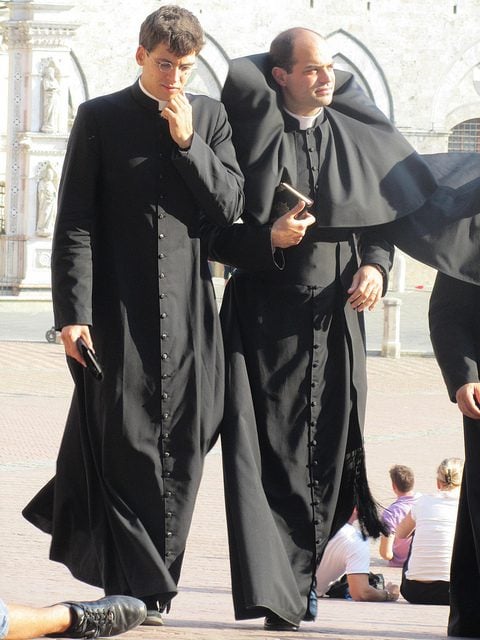
Classic examples of how Catholicism is often criticized with a sort of “rapidfire” / “gotcha!” mentality . . .
*****
[Comments of “morganB” will be in blue; those of “Trinidad” in green]
***
morganB provided us with the following rapid-fire questions (as if mere quantity of objections somehow proves the intended target less plausible):
Globally applied man-made rules frequently clash with how God made us… everyone is unique. Everyone has a unique libido.
Yep. That’s why Paul says that men should “lead the life which the Lord has assigned to him, and in which God has called him” (1 Cor 7:17). Latin Rite Catholicism chooses its priests from the group of men who are called by God to celibacy (1 Cor 7:32-35). He describes marriage as doing “well” (7:38) and celibacy “better” (7:38). Latin Rite Catholicism prefers the Pauline “better” state for its priests, which is following the advice of the Great Apostle in inspired revelation. Sorry to be so biblical!
Moreover, the celibacy requirement is not “globally applied” in the first place. It’s applied to those (a very tiny number of all humanity or all Catholics) who wish to become priests in the Latin Rite: who are already called to celibacy and the priesthood by God (1 Cor 7:17).
When God made Eve did he look for Adam to be celibate?
No. Non sequitur . . .
It is said that St. Peter had a wife.
Yes he did. And it’s said that St. Paul and Jesus didn’t. This is another non sequitur that I just wrote about.
I feel that celibacy is unnatural.
For you and I it is; not for all men, as Jesus said (Matthew 19:10-12). You err in extrapolating merely your own opinion and feelings to the entire human race. Not everyone has to (or wants to) be like you. You go get married (if you aren’t already). Let priests follow their calling from God.
A priest can’t be married because he is unable to attend to his flock?
It’s not an absolute; simply a matter of practicality and wisdom; no divided interest, as Paul notes.
If that was true how is it explained when the church accepts married clergy as converts?
By the saying, “there’s always an exception to the rule.”
How do other faiths deal with this?
They usually don’t. But because we take all of relevant Scripture into consideration, we do.
A prime example of how difficult it is… if a young priest meets a beautiful woman at a church function and falls madly in love, how does he proceed?
He gets away from her and prays for strength to resist temptations that might lead to what is contrary to morality and his vows.
Psychologically, it may be damaging for him to remain celibate.
In extreme cases, he can be released from his priestly duties and laicized.
One doesn’t construct rules and policies (or decide against them) based on hard cases or extreme cases. The lunacy of that mentality is what eventually brought us abortion on demand, for any reason whatever.
****
If there are married priests in the Catholic church regardless of rite then this entire attempt to prove celibacy is better than marriage for priests is so much “sound and fury signifying nothing.” If the point made in the article is correct then the Eastern Churches are a scandal to the rest of the Church failing to follow the ideal laid down in scripture, tradition, and practice or so the author believes.
This doesn’t follow at all. It’s a discipline, not a dogma, and can change, and did change in the Latin Rite. It simply didn’t change in Eastern Catholicism. We in Western Catholicism believe, following Paul, that sacrificial renunciation of sex and marriage is a heroic sanctity (in our priests) not required of everyone, by God (by calling).
The Eastern Church has simply chosen not to make that a requirement for her priests (just as the West used to not do so). They believe, following Paul (1 Tim 3:2) that priests can be married, like bishops (in Paul’s time) could be. That’s not a “scandal” at all. It’s simply a disciplinary choice that is different from Latin Catholicism. But even in the East, bishops must be celibate, so they have followed that course, but in a more limited fashion. They require celibacy of bishops; the West requires it for bishops and priests.
People are so often hung up on anything to do with sex. They have to think in rigid either/or categories: “if marriage is good, then celibacy must be bad” or “if celibacy is the ideal, then marriage must be bad, and sex wicked and evil.” None of that is the scriptural or Catholic view.
St. Paul describes marriage and singleness as “well” and “better” (1 Cor 7:38): not “bad” and “good” or “good” and “bad.”
Eastern Catholicism also has aspects of renunciation: just in different ways. For example, it has a more rigid requirement of fasting before receiving the Holy Eucharist.
The Catholic Church is big enough to have disciplinary and liturgical diversity without having to play the child’s game of fallaciously assuming that one way must be superior to the other. East and West prefer different liturgies; likewise, they can prefer different disciplines regarding priests’ manner of life. Much ado about nothing . . .
***
(originally 9-18-17 on Facebook)
Photo credit: Two Catholic priests in Siena, Italy. Photograph by Leila Heim 558DC (9-28-11) [Flickr / CC BY-ND 2.0 license]
***












